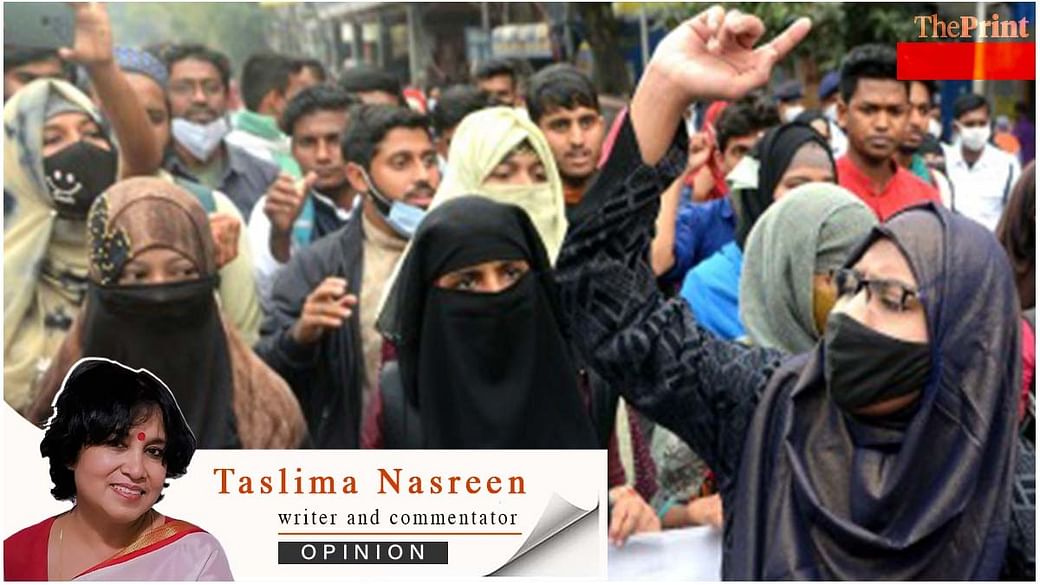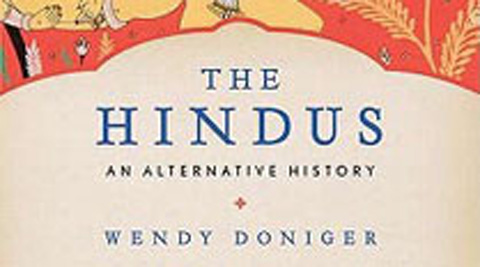Taslima Nasreen in The Print

There is practically no difference between a Jewish, Christian, Muslim or Hindu fundamentalist. They are all primarily ‘intolerant’. Standing next to the mortal remains of playback singer Lata Mangeshkar, Muslims have prayed to Allah, Hindus to Bhagwan, and Christians to their almighty God. Seeing Bollywood icon Shah Rukh Khan lifting his hands in prayer and blowing on her body, some Hindu extremists thought that he was spitting. Then social media mayhem descended.
I have noticed that in India, while Muslims are largely aware of Hindu rituals and practices, most Hindus are ignorant about Muslims ones. Similarly in Bangladesh, Hindus understand Muslim rituals more than what Muslims know of Hindus.
To a large extent, intolerance stems from ignorance. As we saw in the Shah Rukh Khan incident, people from all religions stood behind him. In fact, there are enough liberal and rational people in the Hindu community to oppose the extremists.
The row over hijab
An unnecessary controversy over hijab has erupted in another part of the country, Karnataka. After authorities raised objection to female students from wearing hijab to colleges, the protest by Muslim students started. Then, a group of students donning saffron scarves, took to the streets protesting against the burqa. Chief Minister Basavaraj Bommai ordered schools and colleges to remain shut for a few days. But this is not a solution. If the state fears riots, then violence can erupt when schools and colleges reopen. To prevent riots, the mindset needs to change, and hatred and fear for each other need to be washed clean. In this regard, the Karnataka High Court’s interim order makes sense. I believe, uniform civil code and uniform dress code are necessary to stop conflicts. Right to religion is not above the right to education.
The distance between Hindus and Muslims has not been bridged even after 75 years of Partition. Pakistan has separated from India and has turned into a religious state. But India never wanted to become a Pakistan. Or it could have easily turned into a Hindu State 75 years ago. The Indian Constitution upholds secularism, not religion. This country, with a majority Hindu population, is home to the second largest Muslim population in the world. The laws of India give equal rights to people from all religions, castes, languages, creeds, and cultures.
It is perfectly all right for an educational institution in a secular country to mandate secular dress codes for its students. There is nothing wrong in such a message from the school/college authority that states that religion is to be practised within the confines of the home. Educational institutions, meant for fostering knowledge, are not influenced by religion or gender. It is education that can lift people from the abyss of bigotry, baseness, conservativeness and superstitions into a world where the principles of individual freedom, free-thinking, humanism and rationality based on science is valued highly.
In that world, women do not feel pride in their shackles of subjugation but rather break free from them, they do not perceive covering themselves in a burqa as a matter of right but as a symbol of female persecution and cast them away. Burqas, niqabs, hijabs have a singular aim of commodifying women as sex objects. The fact that women need to hide themselves from men who sexually salivate at the sight of women is not an honourable thought for both women and men.
Education is supreme
Twelve years ago, a local newspaper in Karnataka published an article of mine on burqa. Some Muslim fundamentalists vandalised the office and burnt it down. They also burnt down shops and businesses around it. Hindus also hit the streets in protest. Two people died when the police opened fire. A simple burqa can still cause fire to burn in this state. Riots can still break out over burqas.
A burqa and hijab can never be a woman’s choice. They have to be worn only when choices are taken away. Just like political Islam, burqa/hijab is also political today. Members of the family force the woman to wear the burqa/hijab. It is a result of sustained brainwashing from a tender age. Religious apparel like the burqa/hijab can never be a person’s identity, which is created by capabilities and accomplishments. Iran made hijab compulsory for women. Women stood on the streets and threw away their hijabs in protest. The women of Karnataka, who still consider hijab as their identity, need to strive harder to find a more meaningful and respectable identity for themselves.
When a woman’s right to education is violated on the pretext of her wearing a hijab, when someone forces a woman out of hijab as a precondition to education, I stand in favour of education even in hijab. At the same time, when a woman is forced to wear a hijab, I stand in favour of throwing the hijab away. Personally I am against hijab and burqa. I believe it is a patriarchal conspiracy that forces women into wearing burqa. These pieces of clothing are symbols of oppression and insult to women. I hope women soon realise that burqa is not different from the chastity belt of the dark ages that was used to lock in women’s sexual organs. If chastity belts are humiliating, why not burqa?
Some say that the furore over the burqa in Karnataka is not spontaneous and is supported by political forces. This sounds very familiar to saying that riots do not happen, but are manufactured — mostly before elections and almost always between Hindus and Muslims. Apparently they do count for a few votes. I, too, was thrown out of West Bengal for a few votes.
It is heartening that riots do not happen. It would be frightening if they did happen spontaneously. Then we would have surmised that Hindus and Muslims are born enemies and can never live with each other peacefully.
I believe that even the Partition riots didn’t happen on their own but were made to happen.
A new India
I have heard some Hindu fanatics call for India to be turned into a Hindu Rashtra, where non-Hindus will be converted to Hinduism or be forced to leave the country.
I really do not know if such people are big in numbers. I know India as a secular state and love it that way. I have confidence in the country. Is India changing? Will it change? I am aware of the liberality of Hinduism as a religion. One is free to follow or not follow it. Unlike in Islam, Hinduism does not force one to follow its practices. Hinduism doesn’t prescribe people to torture, imprison, behead, hack or hang someone to death for blasphemy. Superstitions still exist in Hinduism, even though a lot has waned with time. But, India will be a country only for Hindus, anyone criticising Hindus or Hindutva will be killed — are statements that are new to me.
I have been critically scrutinising all religions and religious fundamentalism in order to uphold women’s rights and equality for more than three decades now. My writings on Hinduism and religious superstitions suppressing women’s rights have been published in Indian newspapers/magazines and have also been appreciated. But today, as soon as I pose a question like, “Why do men not observe Karva Chauth for the welfare of women?” hundreds of Hindus hurl personal attacks and abuse on me demanding my expulsion from the country. This is a new India. An India that I cannot imagine. I find their behaviour similar to Muslim fundamentalists. Utterly intolerant.
If India was a Hindu Rashtra, will all fundamentalists and liberal Hindus be able to live peacefully? Will there be no discontent among the dominant and oppressed castes, no discrimination between men and women? A state only for Hindus? Perhaps. Just the way Jews have carved a state for themselves, and Muslims have Pakistan.
I will have to leave a Hindu Rashtra too because I cannot become a Hindu. I am an atheist and a humanist, and I choose to stay that way. Gauri Lankesh, I believe, was a humanist. She was not fit for a Hindu Rashtra, nor will I be.
